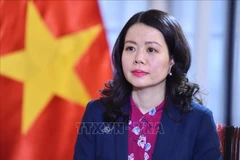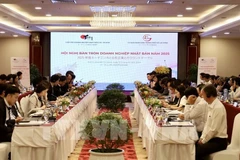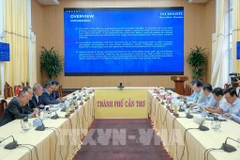This should be one of several drastic actions"bravely" taken by the Government soon, it said, pointing out three mainarguments for an immediate rate cut.
Firstly, the interest rates of Government bonds tend to decline at the end of the year.
Secondly, inflation is being tightly controlled at below 8 percent,which means that there is little difference between deposit interestrates and inflation rates.
There is no risk of depositsbeing withdrawn from the banking system as well, as other investmentchannels including gold, securities and property are too tough atpresent.
Thirdly, exchange rates are stable and people no longer prioritise holding foreign currencies.
The committee said it supposed that interest rate cuts would notaffect people depositing money at banks, citing that deposits haveincreased about 15 percent this year although mobilising interest rateshave been slashed by 5 percent since the beginning of the year.
Government Office vice chairman Pham Viet Muon said the Governmentwould look at falling consumer price indexes over the past months andhold a meeting this week to discuss interest rate adjustment.
He said that 7.5-8 percent would be an ideal mobilising rate for nowand if these levels were reached, banks would be able to set lendingrates at 10 percent.
The committee said interest reductionshould be considered a prerequisite to helping enterprises solvedifficulties. "The number of companies dissolving and halting theiroperations continued to increase in November and there is no sign thatthis will stop; firms are still facing challenges in all aspects," itsaid.
They added that sharply increasing costs of material,fuel and transportation are a major hindrance to business recovery.Enterprises have had to cope with high interest rates of over 15 percentfor over 30 months, and their financial costs increased nearly 25percent within the first quarter of the year, according to thecommittee's report.
While suggesting the nation controllending interests at no more than 150 percent of the prime interestrate, the committee said the Government should speed up its guaranteesfor bank loans to facilitate credit flow.
The committeesaid the national economy has escaped from the bottom zone but themomentum for recovery is still uncertain with a lack of driving forcesto push up total demand.
It noted that inflation has beenslowed down due to weak demand and firms’ lack of capacity to absorbcapital, in addition to the Government's cautious policies.
As well as staying constant with the goals of controlling inflation andstabilising the economy, the Government needs to give clear messages tothe people about banking restructuring and bad debt resolution, itsaid./.VNA
























